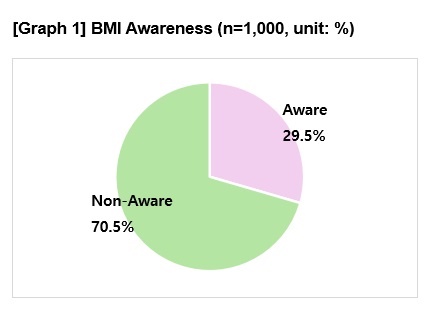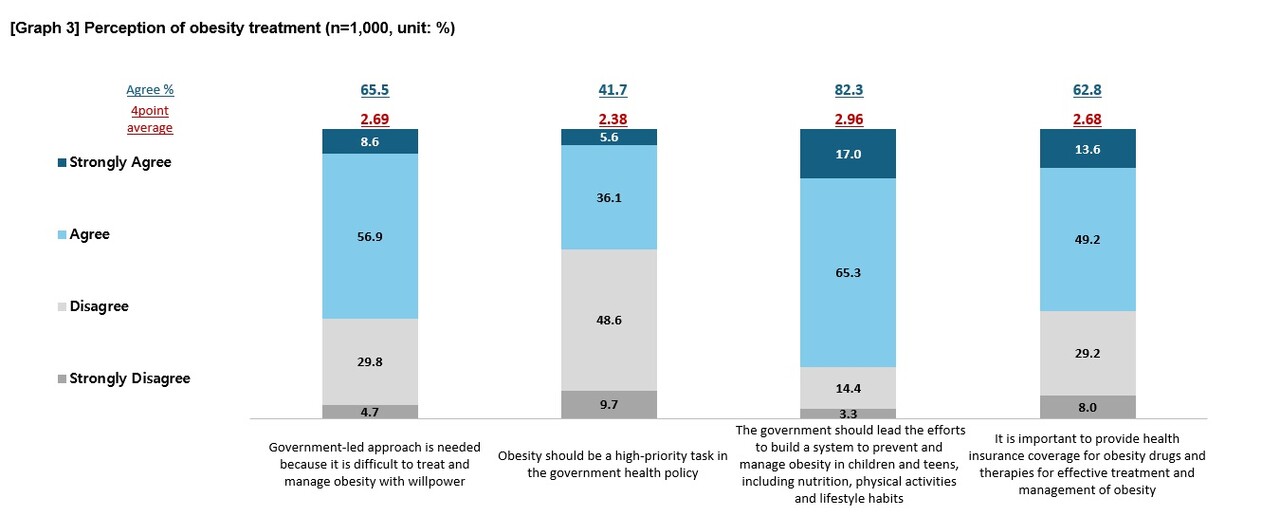A recent survey conducted in Korea has highlighted a concerning lack of awareness among adults regarding Body Mass Index (BMI), a crucial indicator for obesity management.
BMI, calculated by dividing one's weight in kilograms by the square of their height in meters, serves as an indirect measure of body fat.
The survey, undertaken by the Korean Society for the Study of Obesity (KSSO) and supported by Novo Nordisk, found that over 70 percent of adults are unaware of their BMI status.
The survey, conducted online by Macromill Embrain from Jan. 19 to Feb. 2, involved 1,000 adults aged 20 and above.
Out of 1,000 adults surveyed, 26.3 percent were classified as obese (BMI ≥ 25 kg/m²), and an additional 20.2 percent were identified as pre-obese (BMI between 23 and 24.9 kg/m²), indicating that nearly half of the respondents fell into the obese or pre-obese categories.

The survey further disclosed that 70.5 percent of participants, equating to more than seven in 10 people, did not know their own BMI, with a similar proportion among those actually classified as obese.

In contrast to the low awareness of BMI, the survey found a widespread recognition of obesity as a disease requiring treatment, shared by 88 percent of participants. This perception was slightly higher among those aware of their BMI than those who were not.
The KSSO also highlighted that the societal and economic costs of obesity were staggering, with no decrease in the prevalence of adult obesity over the past decade.
According to the KSSO's 2023 Obesity Fact Sheet, adult obesity rates have steadily climbed from 30.2 percent in 2012 to 38.4 percent in 2021, with associated economic losses amounting to approximately 13.85 trillion won ($11.6 billion) in 2019 alone.
The rise in obesity-related diseases, such as type 2 diabetes, hypertension, dyslipidemia, and coronary artery disease, underscores the severity of the issue. Obese individuals face significantly higher risks of developing these conditions compared to those with normal weight.

"The survey was designed to check the level of awareness of obesity and BMI among Koreans as the prevalence and socioeconomic burden of obesity is rapidly increasing," KSSO President Park Cheol-young said. "The survey results showed that less than three out of 10 people know their BMI."
It is urgent to improve BMI awareness for effective obesity treatment and management, and the KSSO is conducting various activities to publicize BMI, Park added.
At the same time, Park stressed that KSSO is proposing that a BMI of 25 (kg/㎡) and above be classified and managed as obesity instead of a BMI 25~29.9 (kg/㎡), which is classified as overweight in the current National Health Examination.
"BMI 25 to 29.9 (kg/m2) is too wide a cutoff and may miss the right time to treat obesity," Park said. "Given that national health checkups are the main route for BMI awareness, proactive and realistic changes to the national health checkup system for BMI are needed."
Related articles
- Obesity epidemic grips Korea: drugmakers rush to develop treatments
- Obesity experts warn against using CGM for weight loss in non-diabetics
- Novo Nordisk's principal scientist outlines global trend on diabetes and obesity
- Boston Scientific launches intragastric appetite suppression balloon 'BIB System' with coverage

